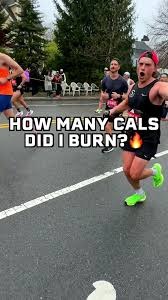Considering signing up for a marathon to burn calories and lose weight? You’re not alone. While weight loss shouldn’t be the primary motivation for marathon running, many athletes find that marathon training provides excellent motivation for maintaining a consistent workout routine and achieving significant calorie burn.
Quick Answer: The average person burns approximately 2,600 calories running a full marathon (26.2 miles), though this varies significantly based on body weight, running efficiency, and other factors.
Let’s explore the science behind marathon calorie burn and provide you with accurate calculations for your specific situation.

Understanding Calories and Energy Expenditure
A calorie represents a unit of energy consumed through food and drink, or expended through physical activity. Your body requires a constant energy supply to maintain vital functions like breathing, circulation, and cellular processes.
Marathon running represents one of the highest calorie-burning activities available, making it an effective tool for:
- Weight management and loss
- Improving cardiovascular health
- Building mental resilience
- Achieving personal fitness goals
Marathon Calories Burned: The Science
Base Calculation Rule
General guideline: Most runners burn approximately 100 calories per mile
For a full marathon (26.2 miles):
- Average burn: 2,600 calories
- Range: 2,200-3,500 calories (depending on individual factors)
Why Running Speed Doesn’t Matter Much
Contrary to popular belief, running faster doesn’t significantly increase calories burned per mile. Whether you complete a mile in 6 minutes or 12 minutes, the energy required to move your body weight over that distance remains relatively constant.
Example:
- Runner A: 8-minute mile pace = ~100 calories/mile
- Runner B: 12-minute mile pace = ~98 calories/mile
The slight difference comes from running efficiency, not speed.

Factors Affecting Marathon Calorie Burn
1. Body Weight (Primary Factor)
Heavier runners burn more calories per mile
| Body Weight | Calories/Mile | Marathon Total |
|---|---|---|
| 120 lbs | 85 calories | 2,227 calories |
| 140 lbs | 95 calories | 2,489 calories |
| 160 lbs | 105 calories | 2,751 calories |
| 180 lbs | 115 calories | 3,013 calories |
| 200 lbs | 125 calories | 3,275 calories |
2. Running Efficiency
- Beginner runners: 10-15% higher calorie burn due to less efficient form
- Elite runners: More efficient movement patterns = slightly lower calorie burn
- Proper training: Improves efficiency over time
3. Terrain and Conditions
- Flat course: Standard calorie burn
- Hilly course: 15-25% increase in calories burned
- Headwind: 5-10% increase
- Hot weather: Slight increase due to cooling efforts
4. Individual Factors
- Age: Metabolic efficiency decreases slightly with age
- Gender: Men typically burn 5-10% more calories than women of similar weight
- Fitness level: Better conditioned athletes may burn slightly fewer calories
- Body composition: Higher muscle mass = higher calorie burn
Accurate Marathon Calorie Calculator
Simple Formula (Most Accurate)
Calories = 0.75 × Body Weight (lbs) × 26.2 miles
Example calculations:
- 150 lb runner: 0.75 × 150 × 26.2 = 2,948 calories
- 170 lb runner: 0.75 × 170 × 26.2 = 3,344 calories
Advanced Calculation by Pace
For more precision, use these multipliers based on your marathon pace:
| Pace per Mile | Multiplier | 150 lb Runner | 170 lb Runner |
|---|---|---|---|
| 6:00-7:00 | 0.72 | 2,835 cal | 3,207 cal |
| 7:01-8:00 | 0.75 | 2,948 cal | 3,344 cal |
| 8:01-9:00 | 0.78 | 3,067 cal | 3,473 cal |
| 9:01-11:00 | 0.80 | 3,144 cal | 3,558 cal |
| 11:01+ | 0.82 | 3,221 cal | 3,644 cal |
Marathon vs. Other Activities: Calorie Comparison
Calories burned in 4+ hours (average marathon time):
| Activity | 150 lb Person | 180 lb Person |
|---|---|---|
| Marathon running | 2,948 cal | 3,540 cal |
| Cycling (moderate) | 1,800 cal | 2,160 cal |
| Swimming (moderate) | 2,160 cal | 2,592 cal |
| Walking (3.5 mph) | 1,440 cal | 1,728 cal |
| Elliptical machine | 2,040 cal | 2,448 cal |
Marathon running burns 45-60% more calories than most other endurance activities.
Optimizing Calorie Burn for Marathon Training
1. Choose Proper Running Shoes
Inappropriate footwear increases energy expenditure through:
- Poor running efficiency
- Increased injury risk leading to inconsistent training
- Biomechanical compensations
For expert guidance on selecting marathon running shoes that optimize performance and prevent injury, visit shoeexpert.net where you’ll find comprehensive reviews and recommendations from running specialists.
2. Incorporate Hill Training
- Benefit: 15-25% increase in calorie burn
- Method: Include 1-2 hill sessions per week
- Caution: Gradually increase intensity to prevent injury
3. Focus on Running Form
- Efficient form: Reduces energy waste
- Key elements: Midfoot strike, slight forward lean, relaxed shoulders
- Training: Consider form analysis or coaching
4. Cross-Training Benefits
While marathon running burns the most calories, cross-training:
- Prevents overuse injuries
- Maintains fitness during recovery
- Adds variety to training routine
Nutrition and Recovery for Maximum Calorie Burn
Pre-Marathon Fueling
Goal: Maximize energy stores without digestive issues
3-4 days before:
- Increase carbohydrate intake to 70% of total calories
- Maintain adequate protein (1.2-1.6g per kg body weight)
- Stay hydrated
Race morning:
- Consume 300-500 calories 3-4 hours before start
- Focus on familiar, easily digestible foods
- Avoid high-fiber or high-fat foods
During Marathon Nutrition
For runs over 90 minutes:
- Consume 30-60g carbohydrates per hour
- Begin fueling within first 45-60 minutes
- Use sports drinks, gels, or energy chews
Post-Marathon Recovery
Within 30 minutes:
- Consume 3:1 or 4:1 carbohydrate to protein ratio
- Aim for 1.2g carbs per kg body weight
- Include 20-25g high-quality protein
24-48 hours post-race:
- Focus on anti-inflammatory foods
- Maintain hydration
- Include omega-3 fatty acids for recovery
Marathon Training and Weight Loss Strategy
Realistic Expectations
Calorie deficit needed for weight loss: 3,500 calories = 1 pound
Marathon training benefits:
- Single marathon burns equivalent to 0.7-1 pound of fat
- Training period (16-20 weeks) provides consistent calorie burn
- Increased muscle mass boosts resting metabolic rate
Training Volume and Calorie Burn
Weekly training calories (intermediate runner, 150 lbs):
| Week | Miles | Estimated Calories |
|---|---|---|
| Base building | 25-35 | 2,500-3,500 |
| Build-up | 35-45 | 3,500-4,500 |
| Peak | 45-55 | 4,500-5,500 |
| Taper | 20-30 | 2,000-3,000 |
Avoiding Common Pitfalls
- Overcompensating with food: Marathon training increases appetite
- Ignoring strength training: Maintains muscle mass during high-volume training
- Neglecting recovery: Adequate rest optimizes fat burning
Gear Considerations for Optimal Performance
Essential Marathon Gear
Running shoes: Most critical equipment piece
- Replace every 300-400 miles during training
- Consider rotation between 2-3 pairs
- Get professionally fitted
Learn more about marathon shoe selection, rotation strategies, and when to replace running shoes at shoeexpert.net.
Additional gear:
- Moisture-wicking clothing
- GPS watch for pacing
- Hydration belt or handheld bottles
- Energy gels or preferred fuel
Weather-Specific Considerations
Cold weather:
- Body burns additional calories for thermoregulation
- Proper layering prevents energy waste
Hot weather:
- Increased calorie burn from cooling mechanisms
- Higher hydration and electrolyte needs
Recovery and Long-Term Calorie Burn
Post-Marathon Recovery Period
Weeks 1-2:
- Significantly reduced activity
- Focus on gentle walking and stretching
- Minimal additional calorie burn
Weeks 3-4:
- Gradual return to easy running
- Cross-training activities
- Resume normal calorie-burning activities
Maintaining Marathon Fitness
Long-term benefits:
- Improved cardiovascular efficiency
- Higher baseline fitness level
- Increased daily calorie burn capacity
Frequently Asked Questions
Q: Do I burn more calories running faster during a marathon? A: Minimal difference. Speed affects total time but not significantly calories per mile.
Q: How does marathon calorie burn compare to ultra-marathons? A: Ultra-marathons burn more total calories but at a lower rate per hour due to walking breaks and slower pace.
Q: Can I rely on fitness tracker calorie estimates? A: Fitness trackers often overestimate by 15-25%. Use body weight-based calculations for better accuracy.
Q: How many calories do I burn during marathon training? A: Training typically burns 2,000-5,500 calories per week, depending on mileage and intensity.
Q: Should I eat back all calories burned during marathon training? A: For weight loss, maintain a moderate deficit. For performance, fuel adequately to support training quality.
Conclusion
Running a marathon burns approximately 2,600 calories for the average person, making it one of the most effective single-session calorie-burning activities available. However, the real weight loss benefits come from the consistent training leading up to race day.
Key takeaways:
- Calorie burn primarily depends on body weight (0.75 × weight × 26.2 miles)
- Training period provides more total calorie burn than race day
- Proper nutrition and recovery optimize fat burning
- Quality running shoes enhance efficiency and prevent injury
Remember, while marathon running offers excellent calorie burn, sustainable weight loss requires a comprehensive approach including proper nutrition, adequate recovery, and appropriate gear selection.
For continued guidance on marathon preparation, running shoe selection, and injury prevention strategies, visit shoeexpert.net – your trusted resource for expert running advice.
Ready to start your marathon journey? Focus on gradual progression, consistent training, and proper preparation. The calories you’ll burn are just one of many benefits awaiting you at the finish line.


